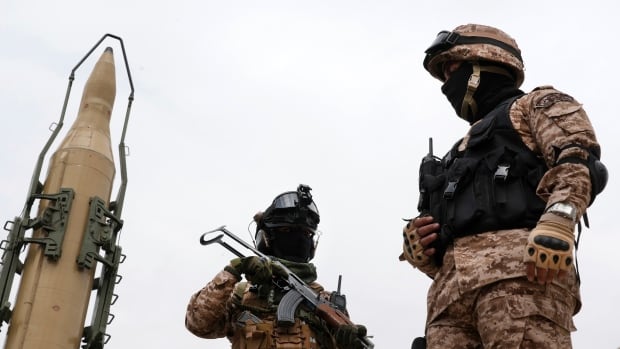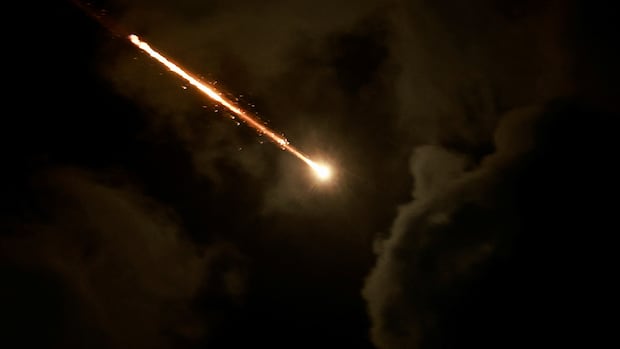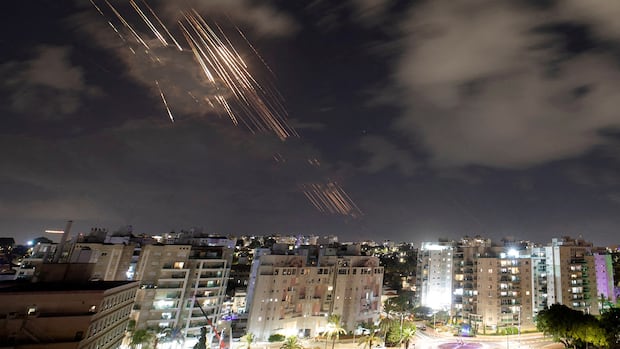When Iran fired roughly 200 missiles toward Israel on Tuesday, Israeli air defences, with some assistance from the U.S., were able to shoot down most of them while sustaining minimal damage, according to officials.
Israel has vowed to strike back, as fears mount over further escalation of hostilities between the two countries.
A quick overview of both countries might suggest that Iran, with a population more than nine times that of Israel’s and a significantly larger army, has an advantage.
Indeed, the Global Firepower Index, which ranks the military strengths of each country, says Iran has the advantage in personnel, and in both land and sea weaponry.
But numbers don’t necessarily present the entire picture, analysts say.
“Israel certainly has more sophisticated military technology than Iran. They have the latest aircraft, armed with modern missiles and bombs,” said Shaan Shaikh, a deputy director fellow of the Missile Defense Project at the Center for Strategic and International Studies (CSIS), a Washington-based think-tank.
“Their air defences are clearly effective. But perhaps most importantly, Israel also has powerful partners, namely the United States, but also those in Europe and the Middle East.”
Prime Minister Benjamin Netanyahu has called Iran’s ballistic missile strike against Israel a ‘big mistake’ vowing to retaliate. Andrew Chang breaks down Israel’s potential response and the likelihood that Iran’s nuclear facilities, oil refineries, and military infrastructure and leaders could be targeted.
By the numbers
In terms of manpower, Israel has about 170,000 active military personnel and 465,000 reservists, according to estimates. That compares to Iran’s 600,000 personnel, 350,000 reservists and 220,000 paramilitary forces.
And with a population of nearly 90 million, compared to Israel’s 10 million, Iran has a significant advantage.
As for other factors, some reports give Iran an advantage in terms of numbers of tanks, artillery and armoured vehicles.
But decades of international sanctions have largely cut Iran off from the latest high-tech military equipment, according to the International Institute for Strategic Studies (IISS), another think-thank, in London.
Iran’s conventional armed forces, although large by regional standards, “struggle with an increasingly obsolescent equipment inventory,” the IISS said in a 2023 report.
Meanwhile, one distinct advantage Israel holds is its air force, considered one of the most advanced in the world.

The Iranian air force has 37,000 personnel, but has only a few dozen working strike aircraft, including Russian jets and aging U.S. models acquired before the Iranian revolution of 1979. Tehran has a squadron of nine F-4 and F-5 fighter jets, some F-7s and F-14s, plus one squadron of Russian-made Sukhoi-24 jets and some MiG-29s, IISS says.
Israel has an advanced, U.S.-supplied air force with hundreds of F-15, F-16 and F-35 multipurpose jet fighters.
“That is a major advantage, especially in the early stages of an Iran-Israel conflict. Iran is still using decades-old aircraft,” said Shaikh.
A war without proxies
Iran’s main advantage against Israel has always been being able to attack through its proxies — including Hamas in Gaza, Hezbollah in south Lebanon and the Houthis in Yemen.
“If you are targeting Iran, you are often targeting its proxies instead,” said Afshon Ostovar, an associate professor of national security affairs at the U.S. navy’s Naval Postgraduate School in Monterey, Calif.
That, he says, has somewhat spared Iran itself from the “death and destruction… it could have faced if it was just fighting all of these conflicts directly.”
Iran launched a series of ballistic missiles at Israel less than a week after the assassination of Hezbollah leader Hassan Nasrallah and a day after ground operations started in Lebanon. The attack has added to fears of a wider conflict in the region.
A war of missiles
Because Iran and Israel are separated by more than 1,000 kilometres, with Iraq and Jordan in between, any conflict would likely not involve a ground invasion, but instead rely on missile attacks.
Iran has the largest and most diverse missile arsenal in the Middle East, which includes thousands of ballistic and cruise missiles, according to a 2021 report.
But Israel has one of the most technologically advanced missile arsenals in the Middle East, it states.
“Iran might have a larger army or population to draw upon,” Shaikh said. “But if a full war breaks out, a lot of the initial fighting will be through air and missile power. And that’s where Israel holds strong advantages.”
Ostovar says the impact of any Iranian missiles would be significant. But, he says, Iran cannot win a war by missiles alone.
Iran “can destroy stuff. It can kill people,” he said. “But it can’t win.”
Israel, as well, wouldn’t be able to defeat Iran just through missile attacks, Ostovar says, but it could inflict much more damage.
Israel can “get right up close to Iran with its F-35s and launch precision missiles that really will hit their targets,” he said.
Defence systems
Israel has sophisticated air defence systems — “some of the best… on the planet,” Ostovar said.
Its Iron Dome system — considered the lower tier of Israel’s air defences — was designed to counter small artillery. It has intercepted thousands since it was activated early in the last decade — including many during the current war against Hamas and Hezbollah.
But in a conflict with Iran, Israel is likely to rely on more advanced systems.
CBC’s Ellen Mauro breaks down why Iran fired roughly 200 ballistic missiles into Israel and the potential consequences for the Middle East.
Israel has two more layers of missile defence: “David’s Sling” can counter short-range ballistic and cruise missiles, Shaikh says.
At the highest end is the Arrow-2 and Arrow-3 interceptors, used against longer-range ballistic missiles.
Iran, however, doesn’t really have anything similar. Ostovar says it has some Russian S-300 surface-to-air missile systems and possibly one S-400, which is “pretty sophisticated,” along with its own domestically built systems.
“These are mostly placed around critical strategic locations like the nuclear sites and the supreme leader’s residence in Tehran,” he said.
“So they could down planes and they could down missiles, but not like Israel can.”
Iran has what is says is a peaceful nuclear program, and there are concerns that it could acquire nuclear weapons, but it is not believed to currently have such weapons.
Israel, however, is widely believed to possess such weapons, even though it will not acknowledge or deny their existence.
“So they’re never going to use [nuclear weapons] as a threat,” Ostovar said. “And they probably would not use it either unless there was some existential reason to do it.”
CBC foreign correspondent Chris Brown gets an inside look at some of the damage caused by Iran’s missile strike in Israel.





